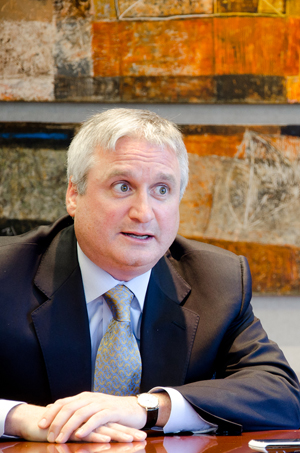Jeffrey Edwards, BCL’86, LLB’86, shares his experiences as an arbitrator specializing in construction and product liability law.
By Victoria Leenders-Cheng

Jeffrey Edwards is a partner and head of litigation at Tutino Edwards Joseph as well as an adjunct professor in the law of sale at the Faculty. An accredited arbitrator and mediator with the Alternative Dispute Resolution Institute of Canada, he has been involved in over 120 arbitrations and mediations, many of them under the Quebec Home Warranty Plan established by the government of Quebec and by the Quebec Building Board (Régie du bâtiment du Québec).
“The variety of arbitration cases in construction and product liability law is extensive,” Edwards says, taking by way of example the range of problems that might arise in the construction of a new home. “You can have structural problems, foundation problems, roof problems, leaking problems, electrical problems, problems of air quality and mold… There are a lot of problems these days with contaminated soil and the cost of removal.”
The ritzy condos sprouting across Griffintown and near the Lachine Canal are all built on redeveloped land, Edwards points out. “Many of the factories in that area have closed, and they’re developing all these condominium projects next to the canal on land that is heavily polluted… the costs to decontaminate are extremely high, and this is but one of the factors that must be taken into account if the matter goes to arbitration.”
Often, Edwards’ involvement as an arbitrator begins when he receives a mandate from an arbitration center, but he has also taken part in cases where attorneys have requested an arbitrator because they prefer to have the case resolved quickly by an expert in the field instead of resorting to litigation in the courts.
“Arbitration can be very challenging because you are no longer pushing just your client’s view or your expert’s view,” Edwards says. “My arbitration practice gives me the opportunity to look at the subject of legal obligations of quality in real estate and manufactured products from all angles and perspectives.”
“As an arbitrator, acting in a quasi-judicial capacity, my job is to apply the law,” he adds. “There’s a certain leeway for interpretation, reasonableness, standards and equity, but it’s always a challenge.”
The law of sale is itself governed by very general provisions, Edwards explains, referring to another area in which he has developed an expertise. Section 1726 of the Civil Code states, broadly, that all objects sold have to render the normal use which they are intended to give – a provision that applies equally to electronics as it does to food, to clothes as it does to pharmaceuticals.
When one expert argues for one approach or interpretation of safety standards and another argues for a differing approach, or if one witness describes a defective product in one manner and another describes it otherwise, the arbitrator faces an intimidating task.
“Arbitration requires that the arbitrator resolve all the issues of fact and law and then apply the law,” explains Edwards. “In that sense, it is the ultimate challenge not only of resolving all the issues of fact and law… but also of putting the often conflicting pieces together to see the whole picture.”
Edwards is also an arbitrator in the alternative dispute resolution component of the Language Rights Support Program (Programme d’appui aux droits linguistiques), an initiative that seeks to inform Canadians about language rights guaranteed by the Constitution of Canada. For more information on the program, see the Alternative Dispute Resolution page of the PADL-LRSP website.
Photo credit: Lysanne Larose.
